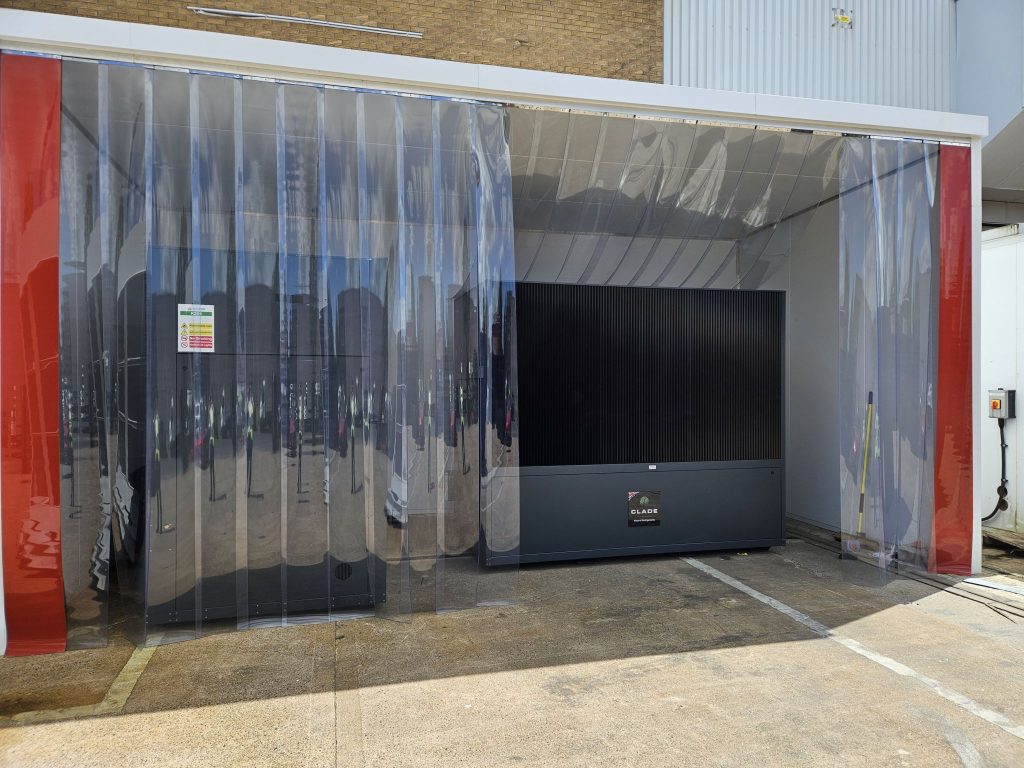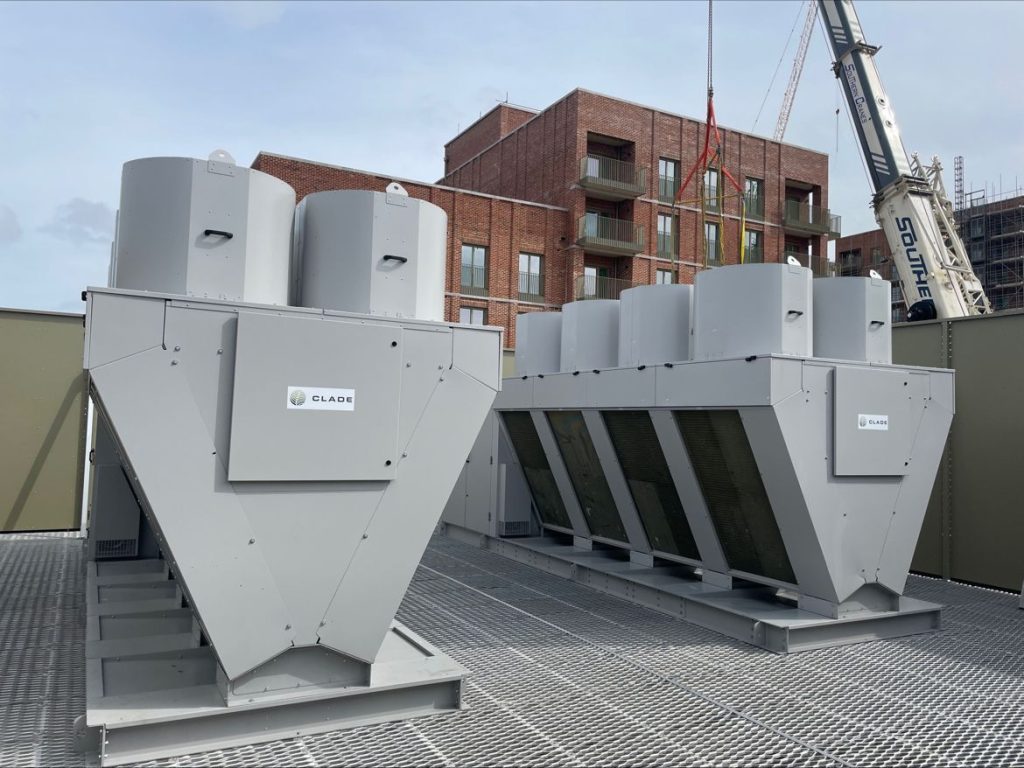Heat pumps and noise: How Clade is breaking barriers

At Clade, we spend a lot of time talking about noise – probably more than we do about any other subject!
We also know that it’s a subject that worries a lot of businesses that are considering investing in a heat pump system.
So, we wanted to share some insights with you about heat pumps and noise. And, in particular, how we’re going above and beyond to tackle the noise issue in our industry.
Here are 8 things that we do better when it comes to noise at Clade.
1. Real-world data
There’s no set standard for what noise data has to be published by a manufacturer.
So, we often see manufacturers providing noise data with no clarification about what conditions their heat pumps have been tested under.
This makes it impossible to compare heat pump units on the market like-for-like.
At Clade, we’ve been doing a lot of work to be best-in-class in this field.
Unlike other manufacturers, we provide test sheets and certification for heat pumps operating at their actual design operation conditions.
This means that the noise data we’re publishing is real-world data – not just a number that’s been manufactured in a lab to try and make our heat pumps look good.
To give you an example, most manufacturers won’t publish at what duty a heat pump was tested.
Without this information, the data is pretty much meaningless. Think about it – a 50kW heat pump is going to be much quieter if it’s only running at 25kW (the fan speed will be reduced and the compressor won’t be working as hard).
On the other hand, at Clade, we’re the only heat pump manufacturer we know of that will tell you where in our operation curve the noise data we’re publishing has been taken from.
2. Highest level testing
Another way in which we’re best-in-class is to do with the level of testing we carry out.
There are different ISO standards for noise testing.
Instead of just relying on the British standard like most heat pump manufacturers, we go above and beyond and test to ISO 9614 – which is sound intensity testing.
There are very few companies in the UK that can offer this level of testing because the equipment is so expensive.
But at Clade, we believe that providing customers with the best and most accurate data we can should be non-negotiable.
Essentially, the noise data that most manufacturers will provide is open field data. This assumes that your piece of equipment is located on a flat piece of land that has nothing on it for miles and miles around – which is obviously unrealistic.
Rather, when you’re looking at noise, you also have to take into account things like reflective noise (eg. noise bouncing off surfaces, buildings, floors etc.) and background noise (eg. sound from traffic where you’re testing).
By testing to ISO 9614, we can make sure that the noise we’re measuring is directional noise that we know has been recorded from the equipment – giving us a hyper-accurate measurement.
3. Accurate modelling
One big benefit of having such accurate noise data is that the noise consultant for your project can use it within their own modelling for your specific site and location.
In this way, they can make sure to get the right results the first time around.
At Clade, we even provide the inaccuracy detail around our numbers within the test certificate.
In other words, you’ll see a plus and minus number on top of our figures to account for any inaccuracies in measurement.
This means that a noise consultant can very quickly see what level of accuracy they need to allow for in their modelling.
Often, you’ll find that noise consultants will take a manufacturer’s number and just assume it includes the inaccuracy – which can lead to problems later down the line.
On the other hand, by providing data that’s as detailed and accurate as possible, we help your noise consultant to more accurately apply it to your specific site and environment – to achieve the most accurate results overall.
4. Avoid problems later down the line
If, after installation, it’s found that the noise coming from your heat pump system is too high, this can lead to complaints and you won’t meet the planning requirements.
This is any business owner’s worst nightmare.
Usually, it means implementing measures that can reduce the impact – like introducing acoustic screening or barriers – which somebody will end up paying a big bill for.
That’s one of the reasons why we’re so passionate about accurate noise measurements here at Clade.
The more accurately we can measure the sound power produced by our heat pumps, the more accurately your noise consultant can apply those measurements to your site. And the more you can trust that the end result will match the results predicted!
If the worst scenario happens and you still run into issues post-installation, you’ll also have some accurate numbers to fall back on.
Your noise consultant can check their modelling against the right numbers for your equipment to understand whether or not that’s where the inaccuracies have crept in. If the numbers are correct in the original model then you’ll know the issue is with something else, which can help to settle arguments and lead to an effective solution.
5. Low-noise technology
Clade is also different in the way that we’re continuously looking to develop and improve our low-noise technology.
Most manufacturers will sell you a heat pump, give you a noise rating (without much context) and then leave you to tackle the issue of noise yourself, through external measures like expensive acoustic fences.
But we believe manufacturers can do better – which is why our approach is to bring low-noise technology into our equipment itself.
By bringing technology into the housings, we’re treating the source of the noise – the heat pump itself – rather than just sticking a plaster on the problem.
In this way, we’ve been able to achieve noise levels that are low enough to negate the need for external noise-mitigation measures – saving our clients space and money!
6. Holistic approach
At Clade, we’re aware that not all the noise transmitted from your heat pump will necessarily be airborne noise.
Rather, you can also experience noise in the form of resonance – ie. vibration.
One common culprit is heat pumps that are placed directly onto a steel grid on a roof, with no break between the piece of equipment and what it’s sitting on.
In this case, resonance will pass through into the building and you’ll experience ‘noise’ which is actually a vibration transfer.
As this kind of noise is very site-specific, it won’t be accounted for in the ISO 9614 noise testing that we described earlier.
However, it’s really important that your noise consultant or designer takes a holistic approach to your project and predicts noise implications like this to prevent issues down the line.
When it comes to this particular scenario, the mitigation method is straightforward and usually involves adding some anti-vibration mounts to prevent the vibration of the kit from being heard in the building below.
7. Meeting planning requirements
Another consideration when it comes to noise is planning.
There are no general noise levels that have to be adhered to in commercial heat pump projects. Rather, every site and planning authority will have different requirements.
This can make the planning process complicated and time-consuming – unlike in some other countries where you can simply put your heat pump details into a website and quickly see whether your project conforms.
In particular, nighttime noise levels (between 11pm and 7am) usually have to hit much lower targets than during the daytime.
At Clade, we’re aware of planning intricacies like this and we try to build these considerations into our technology.
For instance, our software is able to cap units running between those hours, reduce the number of units running (if you have several), or even tell units not to run during those hours at all.
In this way, we’re making it as easy as possible for businesses to reach their planning requirements for noise, enabling them to access the benefits of heat pump technology.
8. Installation quality
Last but not least, we mustn’t overlook the importance of installation quality.
From how the pipes are attached to how well the unit is positioned and how firmly it’s anchored down, every detail matters.
It’s important that your contractor follows the design to a T when it comes to acoustics.
We occasionally see projects where a contractor strays from the design without realising that a small change can have a big effect on acoustics. Some examples include…
- The designer designs a compound with a hit and miss fence but the contractor buys a cheaper compound
- The designer requests a metre and a half clearance around the unit for acoustic reasons, but the contractor leaves a metre instead (the requirement for maintenance access)
At the end of the day, it’s not just about how much noise the heat pump itself makes. It’s also about what’s surrounding your heat pump. After all, a heat pump in a corner will sound louder than a heat pump in the middle of a field.
That’s why employing a quality contractor who will take the time and trouble to get it right is definitely worth it.
At Clade, we can provide an end-to-end service – which means as well as manufacturing your heat pump, we can also design, install and maintain your heat pump system.
Having one team see your project through from start to finish is a great way to ensure that your designer’s vision is brought to life as accurately as possible.
Let’s talk about heat pumps and noise
As you can see, noise can be a controversial topic that’s often shrouded in mystery.
But it doesn’t have to be this way!
At Clade, we’re doing things differently by providing real data that you can hang your hat on – while continuously developing our technology to provide best-in-class heat pumps that are lower noise than our competitors.
In this way, we believe we can make the heat pump industry a more transparent and less confusing place for designers, noise consultants and customers alike!
To learn more about our approach to noise – or to get your own heat pump project started – simply get in touch.

